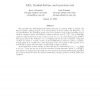Free Online Productivity Tools
i2Speak
i2Symbol
i2OCR
iTex2Img
iWeb2Print
iWeb2Shot
i2Type
iPdf2Split
iPdf2Merge
i2Bopomofo
i2Arabic
i2Style
i2Image
i2PDF
iLatex2Rtf
Sci2ools
FOCS
2009
IEEE
2009
IEEE
KKL, Kruskal-Katona, and Monotone Nets
We generalize the Kahn-Kalai-Linial (KKL) Theorem to random walks on Cayley and Schreier graphs, making progress on an open problem of Hoory, Linial, and Wigderson. In our generalization, the underlying group need not be abelian so long as the generating set is a union of conjugacy classes. An example corollary is that for every f : [n] k → {0, 1} with E[f] and k/n bounded away from 0 and 1, there is a pair 1 ≤ i < j ≤ n such that Iij(f) ≥ Ω(log n n ). Here Iij(f) denotes the “influence” on f of swapping the ith and jth coordinates. Using this corollary we obtain a “robust” version of the Kruskal-Katona Theorem: Given a constantdensity subset A of a middle slice of the Hamming n-cube, the density of ∂A is greater by at least Ω(log n n ), unless A is noticeably correlated with a single coordinate. As an application of these results, we show that the set of functions {0, 1, x1, . . . , xn, Maj} is a (1/2 − γ)-net for the set of all n-bit monotone boolean fun...
| Added | 20 May 2010 |
| Updated | 20 May 2010 |
| Type | Conference |
| Year | 2009 |
| Where | FOCS |
| Authors | Ryan O'Donnell, Karl Wimmer |
Comments (0)

